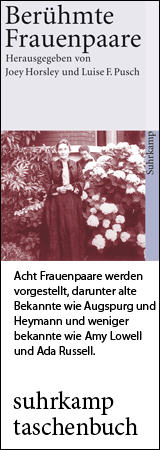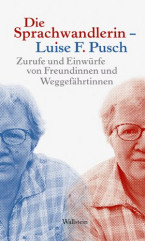
German director, producer and author
born on May 26, 1955 in Hannover, Germany
Biography • Literature & Sources
Biography
“The blue skirt is too blue and the red sweater is too red,” says Lotte, “I want to put on the princess dress.” In her first book for children (1998)—enchantingly illustrated by Julia Kaergel—Doris Dörrie has her characters, a mother and daughter, take the train to work and to preschool with crowns on their heads and wearing magnificent dresses . This scene is exemplary for Dörrie's philosophy: play, dress up, think against the grain, transgress boundaries, transform the serious into something light-hearted, seek out unconventional paths, be in transit…
Doris Dörrie hitchhiked through the Soviet Union, travelled through South America, and made frequent trips in Asia (“I've always had an aversion to backpacks”). Dörrie's travels are also journeys to her self—journeys that return in her films and her books.
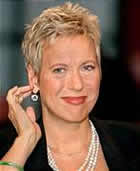 The daughter of a physician, she grew up in Hannover, Germany. After leaving high school, between 1973 and 1975 she studied theater arts and acting in California and New York, and from 1975 to 1978 she studied at the College of Film and Television in Munich. For her final project there Dörrie made the successful film Der erste Walzer/The First Waltz. She then moved on to make children's films (e.g. Paula aus Portugal/Paula from Portugal) and documentaries, which include the portrait of a young shepherdess: Von Romantik keine Spur/Not a Trace of Romanticism.
The daughter of a physician, she grew up in Hannover, Germany. After leaving high school, between 1973 and 1975 she studied theater arts and acting in California and New York, and from 1975 to 1978 she studied at the College of Film and Television in Munich. For her final project there Dörrie made the successful film Der erste Walzer/The First Waltz. She then moved on to make children's films (e.g. Paula aus Portugal/Paula from Portugal) and documentaries, which include the portrait of a young shepherdess: Von Romantik keine Spur/Not a Trace of Romanticism.
Her third feature film, the comedy Männer ... / Men ... (1985), became an outstanding success with the public both at home and abroad and made Doris Dörrie known the world over.
In 1989 Dörrie and a group of friends founded Cobra Filmproduktions GmbH, the company that would produce her subsequent films. In 1987 she began writing as well, including short stories which received numerous awards. Her films and her books now complemented each other: The drama Happy became the film Nackt/Naked (2002), and the collection of short stories Für immer und ewig/Forever and Always was made into the film Keiner liebt mich/Nobody Loves Me (1993). 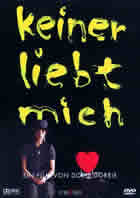
Dörrie's husband, cinematographer Helge Weindler, died during the shooting of Bin ich schön?/Am I Beautiful? (1996). It was not until six years later that Doris Dörrie was able to formulate her loss in the novel Das blaue Kleid/The Blue Dress, which is not a book of mourning, but rather one of consolation: wit and imagination lead her out of the maze. The funeral ceremony on Bali proceeds unwaveringly despite a cloudburst ... This look at unfamiliar rituals gave death a face again, broke one of our society's taboos.
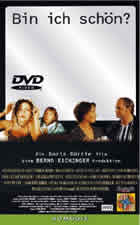 Doris Dörrie dared to tread unfamiliar terrain with her production of the Mozart opera Cosi fan tutte in Berlin (2001). Maestro Daniel Barenboim was enthusiastic about the precision of her work—he, too, loves to leave the beaten path. In January 2003 Doris Dörrie accepted the Cultural Honorary Award of the City of Munich—all told her ninth award—for her cinematic work, the successful film Nackt/Naked, which was shown at the International Film Festival in Venice. The following March she received the German Book Award for Das blaue Kleid.
Doris Dörrie dared to tread unfamiliar terrain with her production of the Mozart opera Cosi fan tutte in Berlin (2001). Maestro Daniel Barenboim was enthusiastic about the precision of her work—he, too, loves to leave the beaten path. In January 2003 Doris Dörrie accepted the Cultural Honorary Award of the City of Munich—all told her ninth award—for her cinematic work, the successful film Nackt/Naked, which was shown at the International Film Festival in Venice. The following March she received the German Book Award for Das blaue Kleid.
Doris Dörrie presently lives in Munich with her daughter Carla, who was born in 1989. “Humor and self-irony,” she says, “are absolutely necessary for survival.”
(Transl. by Rebecca van Dyck)
Author: Birgit-E. Rühe-Freist
Literature & Sources
Dörrie, Doris. 1995. Bin ich schön?. Zürich. Diogenes.
Dörrie, Doris. 1998. Lotte will Prinzessin sein. Ravensburger Buchverlag.
Dörrie, Doris. 1998. Samsara: Erzählungen. Zürich. Diogenes.
Dörrie, Doris. 2001. Was machen wir jetzt? Zürich. Diogenes.
Dörrie, Doris. 2002. Das blaue Kleid. Zürich. Diogenes.
Dörrie, Doris. 2002. Happy. Zürich. Diogenes.
Pressedossier Doris Dörrie. 2003. Zürich. Diogenes Verlag. Presseabteilung.
Spiegel Online Kultur vom 13.02. 2003
If you hold the rights to one or more of the images on this page and object to its/their appearance here, please contact Fembio.







